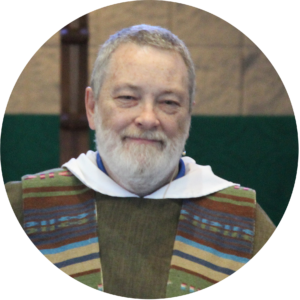 By Fr. Rich, O.P.
By Fr. Rich, O.P.
Our responsorial psalm this week is on point: “Here am I, Lord; I come to do your will.”
Wherever we find ourselves in our faith journey, the bottom line is that our discernment should focus on how God’s will for us is manifested in our lives, faith community, and ministry. When my mom was alive, her observation was, “If God used sticky notes on the refrigerator, it would be so much easier to know what He wanted.” And I’m inclined to agree with her.
The Jewish testament is replete with Yahweh interacting with the Chosen People. There were pillars of fire or smoke; there were voices in the wind; there were angels sent to communicate directly with prophets or people. We could spend thousands of words chatting about the 40-year conversation that Moses and Yahweh carried on.
Even our Christian testament relates stories of angels coming to share the specifics of God’s plan for them. We’ve been hearing them throughout the Christmas season: Mary, Joseph, the shepherds and Magi, and John the Baptist, just to name a few. And of course, we have the penultimate example in Jesus Christ. His submission in the Garden stands as a powerful example of God’s pervasive, relentless love.
So what happened? Has God ceased to communicate His will for us as individuals and as communities? The Jewish people, through the prophets, asked that question when it appeared that God had abandoned them. He never had, but there was too much static sometimes; the message garbled.
Here we stand, offering ourselves and committing to living out the will of God. Frequently we receive a clear, succinct message from God:
When the Pharisees heard that he had silenced the Sadducees, they gathered together, and one of them [a scholar of the law] tested him by asking, “Teacher, which commandment in the law is the greatest?” He said to him, “You shall love the Lord, your God, with all your heart, with all your soul, and with all your mind. This is the greatest and the first commandment. The second is like it: You shall love your neighbor as yourself. The whole law and the prophets depend on these two commandments.” (Matthew 22:34-40)
Clear, concise, and to the point, right? Blood has been spilled determining what “loving God … neighbor …” looks like. Usually, the static comes from ourselves, as we get in the way of the message, coloring it with our own agenda, our own desires.
Right back where we started: “Here am I, Lord; I come to do your will.” And as He so often did, Jesus offered us the answer. His openness to the Spirit, the intentional stepping apart from the noise of the world, the setting aside of whatever might be seen as detracting from the His primary mission: our redemption. Your redemption and mine, generations past and generations to come.
We are called individually and personally by Jesus. If we choose to follow him, we will be asked clearly to preach this message of God’s love, without qualification or editing. I can tell you that it is not an easy invitation to accept. It is not an easy challenge to live out; too often, we impose our own version, our own coloring of God’s love. So have we set ourselves an impossible task? Short answer – No!
We’ve heard these answers before. Returning to Scripture, to contemplative prayer, to an active silence in our hearts and positioning ourselves to see God’s presence more clearly will clear up the static, wash the noise from the message, and allow us to live out the Gospel call of God’s love shared with others.
Believe! Trust! Courage! Action!
These are the watch words. These are the words that will clear up the noise and allow us to see what is means when we say, “Here am I, Lord; I come to do your will.”

